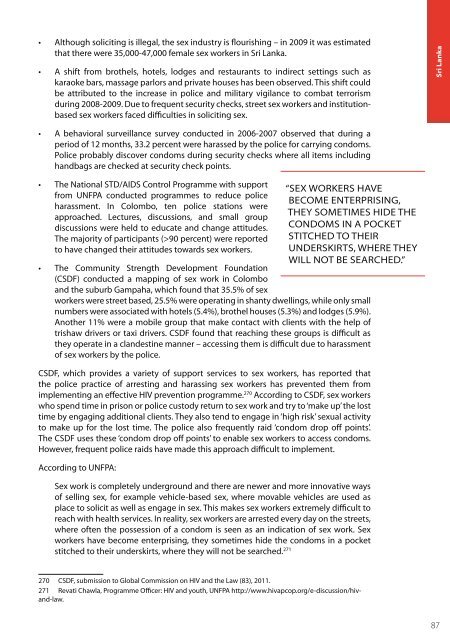SEX WORK AND THE LAW - HIV/AIDS Data Hub
SEX WORK AND THE LAW - HIV/AIDS Data Hub
SEX WORK AND THE LAW - HIV/AIDS Data Hub
You also want an ePaper? Increase the reach of your titles
YUMPU automatically turns print PDFs into web optimized ePapers that Google loves.
Although soliciting is illegal, the sex industry is flourishing – in 2009 it was estimated<br />
that there were 35,000-47,000 female sex workers in Sri Lanka.<br />
A shift from brothels, hotels, lodges and restaurants to indirect settings such as<br />
karaoke bars, massage parlors and private houses has been observed. This shift could<br />
be attributed to the increase in police and military vigilance to combat terrorism<br />
during 2008-2009. Due to frequent security checks, street sex workers and institutionbased<br />
sex workers faced difficulties in soliciting sex.<br />
Sri Lanka<br />
<br />
<br />
<br />
A behavioral surveillance survey conducted in 2006-2007 observed that during a<br />
period of 12 months, 33.2 percent were harassed by the police for carrying condoms.<br />
Police probably discover condoms during security checks where all items including<br />
handbags are checked at security check points.<br />
The National STD/<strong>AIDS</strong> Control Programme with support<br />
from UNFPA conducted programmes to reduce police<br />
harassment. In Colombo, ten police stations were<br />
approached. Lectures, discussions, and small group<br />
discussions were held to educate and change attitudes.<br />
The majority of participants (>90 percent) were reported<br />
to have changed their attitudes towards sex workers.<br />
“<strong>SEX</strong> <strong>WORK</strong>ERS HAVE<br />
BECOME ENTERPRISING,<br />
<strong>THE</strong>Y SOMETIMES HIDE <strong>THE</strong><br />
CONDOMS IN A POCKET<br />
STITCHED TO <strong>THE</strong>IR<br />
UNDERSKIRTS, WHERE <strong>THE</strong>Y<br />
WILL NOT BE SEARCHED.”<br />
The Community Strength Development Foundation<br />
(CSDF) conducted a mapping of sex work in Colombo<br />
and the suburb Gampaha, which found that 35.5% of sex<br />
workers were street based, 25.5% were operating in shanty dwellings, while only small<br />
numbers were associated with hotels (5.4%), brothel houses (5.3%) and lodges (5.9%).<br />
Another 11% were a mobile group that make contact with clients with the help of<br />
trishaw drivers or taxi drivers. CSDF found that reaching these groups is difficult as<br />
they operate in a clandestine manner – accessing them is difficult due to harassment<br />
of sex workers by the police.<br />
CSDF, which provides a variety of support services to sex workers, has reported that<br />
the police practice of arresting and harassing sex workers has prevented them from<br />
implementing an effective <strong>HIV</strong> prevention programme. 270 According to CSDF, sex workers<br />
who spend time in prison or police custody return to sex work and try to ‘make up’ the lost<br />
time by engaging additional clients. They also tend to engage in ‘high risk’ sexual activity<br />
to make up for the lost time. The police also frequently raid ‘condom drop off points’.<br />
The CSDF uses these ‘condom drop off points’ to enable sex workers to access condoms.<br />
However, frequent police raids have made this approach difficult to implement.<br />
According to UNFPA:<br />
Sex work is completely underground and there are newer and more innovative ways<br />
of selling sex, for example vehicle-based sex, where movable vehicles are used as<br />
place to solicit as well as engage in sex. This makes sex workers extremely difficult to<br />
reach with health services. In reality, sex workers are arrested every day on the streets,<br />
where often the possession of a condom is seen as an indication of sex work. Sex<br />
workers have become enterprising, they sometimes hide the condoms in a pocket<br />
stitched to their underskirts, where they will not be searched. 271<br />
270 CSDF, submission to Global Commission on <strong>HIV</strong> and the Law (83), 2011.<br />
271 Revati Chawla, Programme Officer: <strong>HIV</strong> and youth, UNFPA http://www.hivapcop.org/e-discussion/hivand-law.<br />
87
















